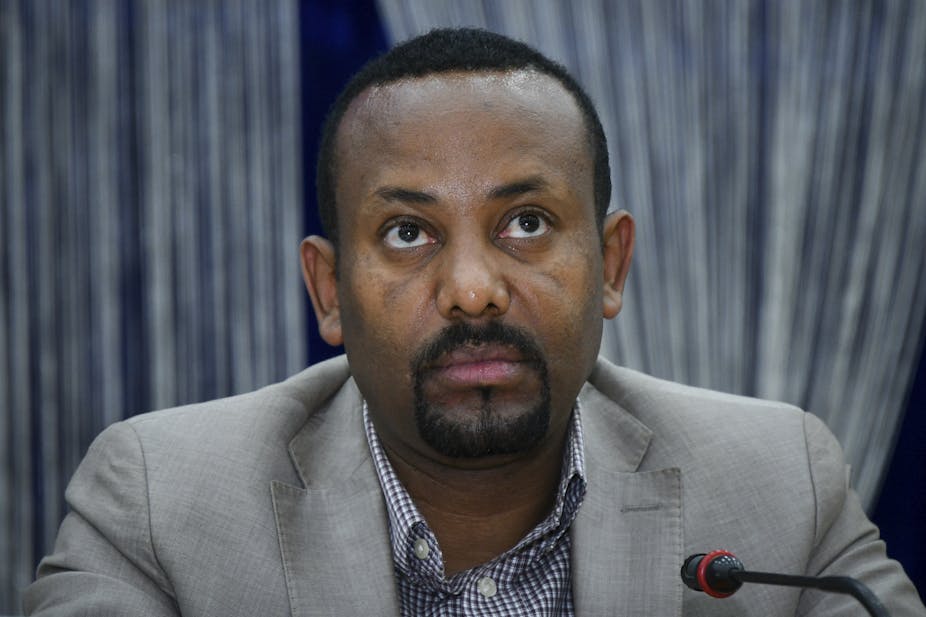Ethiopia has been rocked by a series of protests over the past four years. These rallied against public corruption, the economic marginalisation of some ethnic groups, and youth unemployment.
The government responded with a heavy hand. Hundreds of lives were lost; businesses and properties were destroyed. Instead of dialogue and fundamental changes, the regime kept on deploying an odd combination of promises of reform and crackdowns.
The repressive measures gave common ground to local movements which cropped up in different regions. These included Qeerroo of Oromia, Fanno of Amhara and Zerma of Gurague. Anchored on issues rather than personalities, the movements were able to outwit the regime with their narrative and strategy. They blocked the roads and shut businesses, undermining the regime’s ability to control and ensuring the masses were informed of looming government actions.
Media outlets in the diaspora, energetic bloggers and internet savvy youth also provided alternative narratives to the regime’s.
The main casualty from the regime’s side was Prime Minister Hailemariam Desalegn. His downfall, however, came with a touch of irony. He was arguably the least corrupt member of the ruling Ethiopian People’s Revolutionary Democratic Front (EPRDF) and was keen to purge corrupt leaders. But he was outmanoeuvred and finally resigned in the hope that his departure would pave the way for genuine reform.
The interregnum between Hailemariam’s departure and the election of Abiy Ahmed was filled with foreboding. Some warned of the country’s imminent collapse.
Ahmed’s appointment has triggered mixed reactions among the anxious establishment and citizens: trust, doubt, excitement – and fear.
Amid the hope, lingering questions hover over his leadership. Ethiopia would face insurmountable problems if he fails to deliver on his promises. On the other hand, he has the opportunity to forge a new movement that can lead Ethiopia away from identity politics to the politics of ideas.
Popular tide
Despite being nurtured within the Ethiopian People’s Revolutionary Democratic Front, Ahmed doesn’t sound like any of its former leaders.
Unlike the Ethiopian politicians of the last four decades his rhetoric mimics neither Albanian Marxism nor Maoism. He has anchored his story on local cultural innovations.
He comes across as remarkably authentic and engaging. In addition, he has distanced himself, at least in his political outlook, from his party’s maligned old guards.
Amid the turmoil leading up to his election, his routine visits and open conversations with people made them feel their grievances were being heard. The nation, including opposition parties, stopped protesting and started listening.
He also did not hide that reconciliation was his biggest, and the most urgent, project.
But Ahmed remains an enigma. There are lingering doubts about him. For example, the Oromo nationalist movements dislike the that fact he’s from the establishment. At the same time they see reason to protect him because he came out in support of them during a critical period of Qeerroo’s movement.
The Fanno movement from Amhara are equally sceptical about him. On his visit to Gondor and Bahir Dar in Northern Ethiopia he had tense exchanges with the people from the region who didn’t hold back their frustration and anger over economic marginalisation of the Amharas.
But they also feel he can deliver an arrangement of peaceful coexistence between ethnic groups. Ahmed’s speeches about a unitary state are music to the ears of people who have fought for national integration.
Finally, some Tigrayans were quick to air their doubts about his premiership. They pointed out that he wasn’t vocal enough in condemning the alleged atrocities committed against Tigrayans in different regions during the protests.. Others said he lacked the experience to occupy the top position in the land.
But they also see him as a calming factor and the voice of moderation precisely because they realise things could have spiralled out of control without his conciliatory voice.
After the confusion?
Ahmed has portrayed himself as a great storyteller, unifier, motivator, and at times an “educator-in-chief”. Those qualities were necessary to buy Ethiopians’ patience. The nation has taken time and listened to him.
Now he needs to convert his vision into concrete policies. He has shown signs of resilience in bringing about reconciliation. He pardoned political prisoners including Andargachew Tsige, a prominent leader of an opposition party, Ginbot 7. Such decisive moves in other areas would enhance public trust in him.
As he moves forward, he needs constructive criticism to keep him grounded. Popular support will also ensure his efforts are not derailed by the deep state. But he also needs to persuade Ethiopians, in practical terms, that the distance he created between himself and the ruling elites is genuine. Reappointing deeply unpopular members of his party or pardoning former politicians previously convicted of corruption would cost him his political capital and make the reform process untenable.
It is also well known that the Ethiopian military, security and judiciary are controlled by the Tigrayans People Liberation Front (TPLF). He needs to demonstrate that he can take command of these institutions and ensure they serve the nation independently, in an ideologically neutral way.
His reform efforts are advancing towards the centre of power – controlling military and security. In the last few days, he has lifted the State of Emergency and challenged the military apparatus to transcend party politics. Such a change has a direct bearing on the freedom of speech and press freedom. Moreover, it also creates a political space to foster active civic participation and ensure accountable governance"
And finally, if he’s serious about forming a unitary state without undermining ethnic identities, he needs to amend the highly contested Article 39 of the constitution which grants all people of Ethiopia self-determination including the right to secession. This unbalanced emphasis on ethno-nationalism might lead the nation towards possible splintering and balkanisation.

